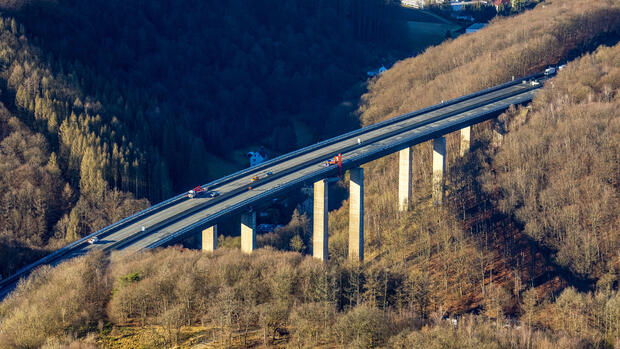Berlin. After much pressure from the federal states, the federal government now appears to be ready to negotiate sustainably accelerated planning and approval procedures at federal, state and local level.
As the Handelsblatt learned from government circles, the prime ministers could already agree on a corresponding “pace pact” at one of the next conferences with Chancellor Olaf Scholz (SPD).
Among other things, the federal government suggested digitizing procedures in the state and local authorities and even creating a federal and state staff pool so that enough specialists can work on projects on site. Despite constitutional concerns, this is “critical to success”.
The countries demanded changes and, above all, concrete commitments. There is talk in the paper of too many “test orders”, it said again these days from state chancellery.
States have been waiting for an invitation from the federal government for months
The federal states expect concrete statements, for example, on the question of how the replacement of a bridge or a wind turbine can be planned in a simplified way – even if the new system is larger than the previous one.
Transport Minister Volker Wissing (FDP) revised his previous draft law after the agreement.
(Photo: dpa)
So far, these projects are only exempt from extensive planning procedures if they are built exactly as before. However, since traffic is increasing and so is the demand for green electricity, replacement bridges and wind turbines have to be planned larger. This entails many approval processes.
To date, however, there have been no negotiations. The federal-state working group has not yet met. There is also no official invitation yet, according to several state chancellery offices. However, there is a signal that the pact will be approved at the prime ministers’ conference in mid-June.
“The aim of the federal government is to successfully complete the work on the pact for planning acceleration by summer 2023,” a government spokeswoman explained to the Handelsblatt. In the spring, the federal government “obtained further concrete proposals from the federal states”. These would now be “tested and incorporated”. The new concept should then be discussed with the federal states.
>> Read here: Secret meeting without result: coalition disagrees on how planning procedures should be accelerated
At the request of the Chancellery, the topic will not be put on the agenda at the Prime Ministers’ Conference on May 10, according to state circles. On the one hand, the urgent question of refugee policy is at the center there. On the other hand, the Federal Chancellery still needs time to draw up the new draft for a pact.
The federal government does not want to know anything about the standstill
A government spokeswoman struggled to deny the standstill on the important issue. “Around a dozen legislative amendments have already been passed,” she said. “The measures adopted include, among other things, the establishment of the outstanding public interest in renewable energies and other selected infrastructures, shortening of the administrative process, digitally based public participation, nationwide standardization in the area of species protection, in certain cases the waiver of the environmental impact assessment and the species protection assessment and the Elimination of redundancies in renewed public participation.”
The federal government will continue its “modernization course”. This includes implementing the decisions of the coalition committee. They are “another contribution” to the “desired” federal-state pact.
In recent months, the reason given repeatedly for the suspended negotiations is that the federal coalition must first agree on its acceleration package for infrastructure projects. SPD, Greens and FDP argued about the fundamental question of whether motorway projects should also benefit from accelerated procedures. At the end of March, after a marathon of negotiations, the coalition agreed on a “modernization package”.
Transport Minister Volker Wissing (FDP) revised his previous draft law after the agreement. A number of rail and 144 motorway projects are now to be defined as “outstanding public interest”.
This means that the projects have priority in court, since other interests are no longer examined. However, the federal states themselves must classify the respective projects as so important. Green state ministers have already announced resistance.
Wissing’s plans also envisage replacing dilapidated bridges without lengthy procedures and also adding lanes if this is necessary in view of the increasing traffic. The motorway sections in front of and behind the bridge are then to be expanded at a correspondingly accelerated rate.
>> Read here: The traffic light is struggling – no agreement on climate protection
However, this provokes trouble. Antje von Broock, Managing Director of the German Association for the Environment and Nature Conservation (BUND), warns that the construction of additional lanes when replacing dilapidated bridges on motorways and federal highways should serve “to later be able to more easily implement the climate-damaging expansion of entire road sections”. The destruction of nature and the consequences for the climate are “not sufficiently considered,” she told the Handelsblatt.
More: The truth about the sluggish Autobahn expansion: A Berlin bazaar will decide Germany’s future
